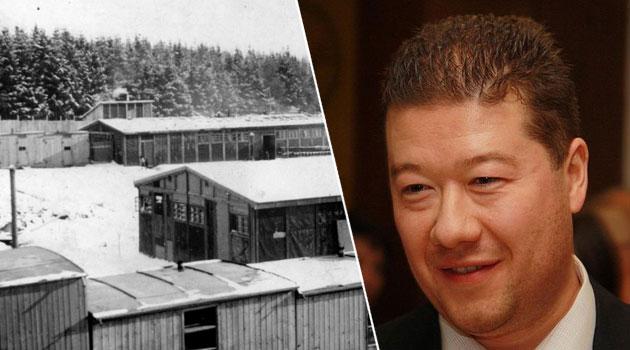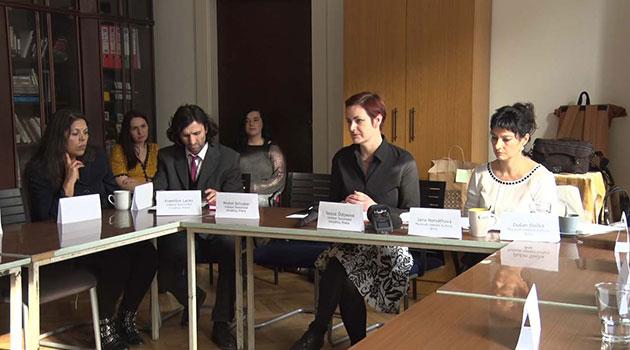Czech citizens file crime report over MP's remarks denying the suffering of Romani genocide victims

Czech MP Tomio Okamura is being reported to the authorities on suspicion of criminal activity because of remarks he made denying the suffering of the Romani victims of the Holocaust at the Lety u Písku concentration camp. An open letter sent to news server Romea.cz by its signatories has announced that fact.
“A criminal report will be filed naming Tomio Okamura as the perpetrator. Such an action is part of the safety valves of a democratic state. We are aware that proving guilt according to Section 405 of the Criminal Code is not easy and that T. Okamura may not be found guilty. Despite that, we are of the opinion that it makes sense to send this open letter as a signal to the public that there are moments when it is not appropriate to keep quiet and remain indifferent,” reads the letter, which news server Romea.cz is publishing in full translation below.
Section 405 of the second part of the Criminal Code, Chapter XIII, Part 1, describes the crime of “Denying, doubting, approving of and justifying genocide” as follows: “Whoever publicly denies, doubts, approves or attempts to justify the Nazi, Communist or other genocides, or the Nazi, Communist or other crimes against humanity, or war crimes, or crimes against peace, will be punished by deprivation of liberty between six months and three years.”
Open Letter to the Czech Public in Response to the Remarks of Tomio Okamura
As citizens of the Czech Republic, we are using this open letter addressed to the Czech public to express our disagreement with the remarks made by Tomio Okamura on 27 January, the occasion of International Holocaust Remembrance Day, to the DVTV media outlet.
This is not the first time that a Czech politician has spoken words belittling the suffering of the people who were imprisoned in the so-called Gypsy Camp at Lety u Písku. It is not even the first time that words doubting the function of that camp have been spoken by Tomio Okamura. However, it is especially cynical that he spoke those words on a day when the entire world commemorates the horrors of the Holocaust, the suffering of those who went through it, and all who did not survive.
We are citizens of this state, we live here, we work here, and we are raising our children here. We disagree that a politician who holds a high state office such as that of vice-chair of the Chamber of Deputies should be able to publicly make remarks denying the Holocaust, not just because to do so is against the law, but primarily because of the impact of such words.
Just like the staffers of the Museum of Romani Culture, we are convinced that Tomio Okamura should take responsibility and distance himself from his remarks.
Last year, after more than 25 years, the state managed to conclude an agreement to buy the pig farm that stands on the site of the former concentration camp at Lety. That important step came after individual activists and institutions involved with Holocaust commemoration had spent years calling for the farm to be removed. The purchase of the pig farm sent a signal to the public that the Czech state is finally facing up to these traumatic moments of our history. Only by sufficiently recognizing these traumatic moments of modern history will we be able to discover their causes and effects and build up the self-awareness that is important to our lives today. It is not by denying responsibility, but by acknowledging and bearing it, that individuals and societies become resistant to lies, populism, extremism and disinformation. Only if we manage to come to terms with our own past can we look to the future without fear.
A criminal report will be filed naming Tomio Okamura as the perpetrator. Such an action is part of the safety valves of a democratic state. We are aware that proving guilt according to Section 405 of the Criminal Code is not easy and that T. Okamura may not be found guilty. Despite that, we are of the opinion that it makes sense to send this open letter as a signal to the public that there are moments when it is not appropriate to keep quiet and remain indifferent.
We are living at a time that is sometimes called “post-factual”, when the truth is being blurred and opinions are being presented as facts. However, it is still the case that the truth is the truth and a lie is a lie. The remarks by the vice-chair of the lower house are lies, and no matter how loudly he shouts them, they will never become the truth.
The situation in the camp at Lety was described by Czech doctor František Patočka as follows:
I recall that only the mobile, healthy children had crawled to the edge of their shared bed and seized some of the food… The children who were obviously ill and weak got practically no food at all. During this ‘catering’ to the Gypsy children, which was more like a poorly-performed feeding in some zoological garden, I noticed that most of the children were dressed in shirts that were falling apart and some were absolutely naked. The only bedcover for the herd of children was a large piece of canvas sail which, naturally, was not enough to cover them all, so they pulled it back and forth among themselves …
Most of the children defecated and urinated where they were, because in the improvised barracks there were no toilets. In order to ascertain the actual state of the hygiene beneath the canvas, I removed it entirely. The very first thing that I became aware of, to my horror, were the many corpses of other little children lying among the living ones. The second, even more horrible thing I saw was children who were obviously in agony, some of them still with fever, with terrible gangrene rising along the entire lower limb… I recall absolutely clearly, to this day, that the image I beheld exceeded even the most tremendous description of Dante’s Hell in terms of horror …”
(From Červenka, Juraj, Škvrnitý tyfus, Martin: Nakladatelství Osveta, 1955, page 18)
That was the reality of life in the so-called Gypsy Camp at Lety u Písku – not free movement of persons or a lack of fencing [as Okamura has alleged]. Human beings were interned there against their will because of their race and the vast majority of them did not survive the war, either dying right there, as most of the children did, or later in the death camp of Auschwitz-Birkenau.
We, the signatories to this letter, are part of civil society, which serves an irreplaceable function here: If the elected representatives of the state fail in their work and their mission, then it is exactly civil society that must warn of this failure. Precisely for the reason that we are raising our children here, we cannot and we will not stay silent. We do not want them to grow up to be indifferent people who will never believe in anybody or anything, who will never believe in values such as human rights, human dignity, democracy, the rule of law, justice, honor and equality. That would be a sad future.
Each one of us can do something to defend the values that are meant to be protected by the high representatives of this state, despite the fact that they frequently are not protected by those representatives – we can appeal to our MPs to raise this subject in the lower house, to our Senators to involve themselves in this topic, to our teachers to introduce modern history and critical thinking in the schools, to organize field trips to remembrance sites and to invite eyewitnesses, historians and experts to join them. We can talk about this all at home, the media can write about it. We can organize lectures and workshops in the places where we live.
Nobody else but us is going to do this for us.
Signed,
Marie Smutná, Magdalena Křížová, Ruth Weiniger, Tereza Štěpková, Dana Gabaľová, František Lacko, Jana Kosáková, Eva Fantová and Rudolf Murka
Should anybody else wish to support this letter by signing, they can do so here.
We will be glad if you share the letter with others.
CC: DVTV, Respekt, Česká televize, Seznam zprávy, Aktuálně.cz, Hospodářské noviny, Romea.cz, Právo, Blesk, A2larm, Deník Referendum, ČTK, Public Defender of Rights Mgr. Anna Šabatová, Ph.D.
